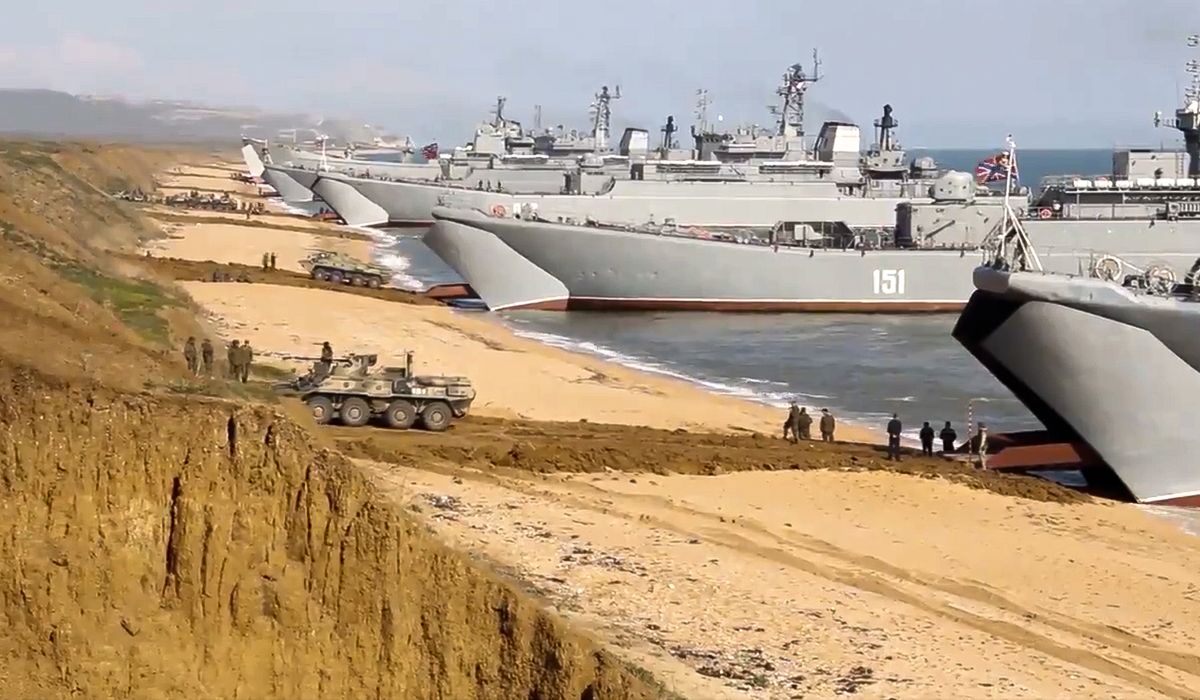
President Biden and Russian President Vladimir Putin are set to speak Thursday as relations between the U.S. and Russia approach “a moment of crisis,” amid Russian troops massing near the Ukraine border.
The two leaders are hoping to ease the tension through diplomacy, but a senior White House official told reporters the U.S. is prepared to respond with harsh sanctions if Russia advances into Ukraine.
“I think both leaders believe there is genuine value in direct leader-to-leader engagement, that we are in a moment of crisis and have been for some weeks now, given the Russian build-up,” the official said, speaking on the condition of anonymity to reporters.
“It will take a high level of engagement to address this and to try to find a path to deescalation,” the official continued.
But the official noted that the administration has not seen an effort by Russia to reduce tensions.
If Russia invades Ukraine, the U.S. intends to bolster NATO’s “force posture” in eastern Europe and will help Ukraine defend itself, if necessary, the official said.
Mr. Biden is expected to take the call, scheduled for Thursday afternoon, at his residence in Wilmington, Delaware, where he is spending the upcoming New Year’s holiday.
The pair held a video conference this month, with Mr. Biden expressing concern about Russia’s troop build-up. During that call, Mr. Biden warned his Russian counterpart that the U.S. would impose “strong economic and other measures” if Ukraine is invaded.
Mr. Putin, in kind, warned that Russia will act if NATO expands its military presence into Ukraine. He also demanded a guarantee from the U.S. and NATO that neither will defend Ukraine — a demand U.S. officials rejected.
“It remains a continuing source of great concern, what the Russians have been putting in place in and around that border area,” the White House official told reporters. “And we would like to see a reduction in that build-up and the return of forces to their regular training areas or their long-term deployment areas.”
Tensions between the U.S. and Russia extend beyond Ukraine. On Wednesday, the U.S. condemned a Moscow court shutting down a prominent human rights group. The court revoked Memorial Human Rights Center’s license after Russian authorities labeled them “foreign agents.” The move came a day after the Russia Supreme Court revoked the legal status of International Memorial, the parent organization of Memorial Human Rights Center.
In 2014, Russian troops advanced into Crimea and annexed the peninsula from Ukraine, a development that was seen as a major foreign policy disaster for then-President Obama.
U.S. intelligence officials, according to The Washington Post, have warned that Mr. Putin, with roughly 100,000 Russian troops amassed along the Ukraine border, could be planning a multipronged offensive in early 2022.
Ukrainian Defense Minister Defense Minister Oleksii Reznikov said this month that Moscow may be preparing for a large-scale military invasion at the end of January.
Russian officials have insisted they have no plans to invade and say the troops are there for military exercises.
This month, Mr. Biden dismissed the idea of putting U.S. troops in Ukraine to deter a potential Russian invasion
“That is not on the table,” Mr. Biden told reporters.
“We have a moral obligation and a legal obligation to our NATO allies if they were to attack under Article 5. It’s a sacred obligation. That obligation does not extend to … Ukraine,” he said. “But it would depend upon what the rest of the NATO countries were willing to do as well.”
Mr. Biden will continue to coordinate with European allies for “a common approach in response” to the Russian military build-up, the White House said.
The president also has consulted with the Bucharest Nine, a group of Eastern European nations, including Bulgaria, Czech Republic, Estonia, Hungary, Latvia, Lithuania, Poland, Romania and Slovakia, according to the White House.
U.S. and Russian officials are scheduled to discuss Ukraine in a Jan. 10 meeting. That will be followed by a Jan. 12 meeting of the NATO-Russia council and a Jan. 13 meeting of the Organization for Security and Cooperation in Europe’s Permanent Council.
Secretary of State Antony Blinken on Wednesday spoke with Ukrainian President Volodymyr Zelenskyy. The two discussed efforts to “peacefully resolve the conflict in eastern Ukraine and upcoming diplomatic engagements with Russia,” according to a White House readout.
• Joseph Clark contributed to this article.
